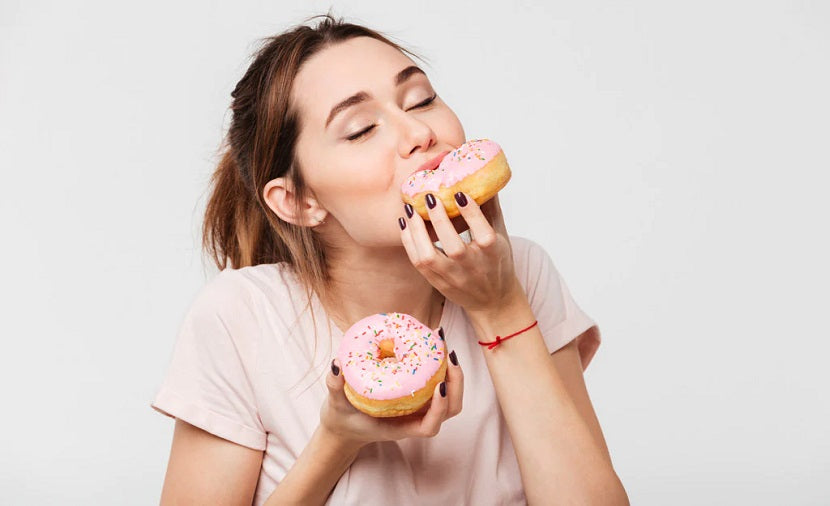
Is Food Your Comfort?
By Lauren Jane

Emotional eating involves consuming food in response to a wide variety of emotions – sadness, stress, anxiety, anger, boredom, loneliness and even happiness!
This type of eating usually manifests as:
- Binge eating
- Night eating
- Unnecessary snacking
- Constant grazing
The eating itself is reported to fill some kind of void, soothe negative emotions and act as a distraction from the present moment. Sadly this approach does not last and is usually followed by feelings of guilt, wanting more and results in detrimental effects upon one's health, including bloating, nausea, fluid retention, stress, anxiety, raised cholesterol and weight gain.
Why do we emotionally eat?
Studies have also found that individuals seem to confuse their internal states of hunger and satiety with the physiological changes that happen in their bodies when they’re emotional.
Another key reason for emotional eating is that people are not equipped with other tools to manage the stress or emotional upheaval of their life so instead they use food to self-medicate, much like they might cry for milk when they are a baby.
How exactly does food make us feel better?
Research has shown that emotional eaters usually reach for energy-dense foods - those rich in carbohydrates and sugar. Interestingly the increased consumption of carbohydrates leads to increased production of an amino acid known as tryptophan. Tryptophan is what’s needed to make our happy chemical serotonin, which means that eating carbs leads to a boost in our overall mood!
This begs the questions - next time you sit down to have a biscuit with your coffee, a bar of chocolate in the evening or a handful of lollies from the office bench, ask yourself: Am I really hungry or am I needing a bit of a boost?

Whilst occasional soul food is inevitable and completely OK, many women have spent a lifetime using food and or alcohol to soothe themselves and alleviate feelings of emotional deprivation.
So when trying to lose weight for improved health, we encourage you to develop other ways that make sure you’re adequately meeting your emotional needs. Then when you embark on a health transformation and remove the things they've been relying on, you won’t end up feeling lost or emotionally empty.
How to overcome emotional eating
When you turn to food to distract from the present moment, ease feelings of hurt from the past or emotionally ‘fill your tank’, what can result is rebound binge eating which occurs in an attempt to restore homeostasis.
To prevent this from happening, you need to take a HOLISTIC approach to your weight loss plan. That means not only focusing on portion control and avoiding harmful foods, but also reconnecting with or finding your passions. Ask yourself: What do I love to do? What truly feeds my soul?
I also encourage you to tune into whatever feelings that arise and implement stress management and self-love practices every single day. These might include a morning mantra, a gentle yoga practice, meditation, nightly gratitude journaling, time in nature, breathing exercises, a bath with essential oils or being creative with art or music.
I want to finish by saying that eating to excite your senses rather than to fuel your physical body is OK! Even eating to comfort a broken heart or stressed mind is fine once in a while. However, food should never be our primary coping mechanism.
Check out our other article on mindful eating to reduce your chances of binge eating. You'll also find valuable tips that can help you with weight loss and feeling good all over.
Our latest HAPPY HEALTHY YOU guidebook also explains the Happy Healthy You philosophy and teaches you how to heal and regenerate the body through healthy life practices and food choices. Check it out by clicking on the image below.
REFERENCES
Frayn M, Livshits S, Knäuper B. Emotional eating and weight regulation: a qualitative study of compensatory behaviors and concerns. Journal of Eating Disorders. 2018;6:23. Published 2018 Sep 14.
https://doi.org/10.1186/s40337-018-0210-6
Nguyen-Rodriguez ST, Unger JB, Spruijt-Metz D. Psychological determinants of emotional eating in adolescence. Eating Disorders. 2009;17(3):211-224.
https://doi.org/10.1080/10640260902848543
Tan, Cin Cin & Chow, Chong Man. Stress and emotional eating: The mediating role of eating dysregulation. Personality and Individual Differences. 2014;66(8):1–4.
https://doi.org/10.1016/j.paid.2014.02.033
Konttinen, H., van Strien, T., Männistö, S. et al. Depression, emotional eating and long-term weight changes: a population-based prospective study. International Journal of Behavioral Nutrition and Physical Activity. 16, 28 (2019).
https://doi.org/10.1186/s12966-019-0791-8








Leave a comment
This site is protected by hCaptcha and the hCaptcha Privacy Policy and Terms of Service apply.